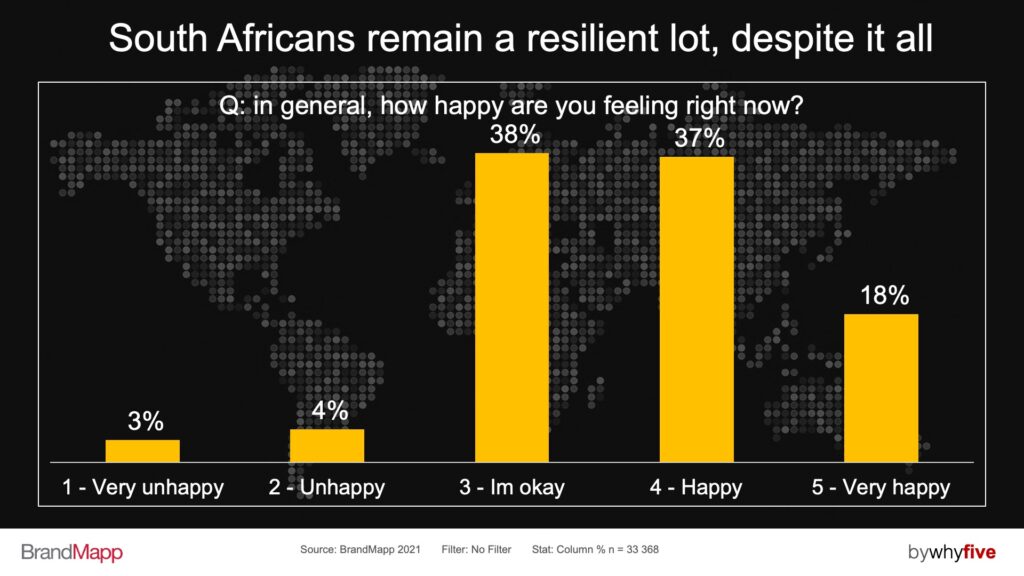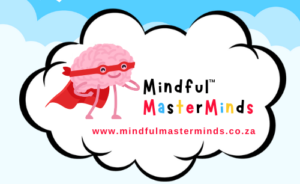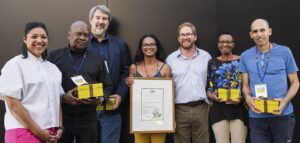Any measure of happiness in South Africa during COVID times has to take into consideration that we are a nation, already chronically and highly stressed by the impacts of obdurate social and economic inequality. When a mega-sample of 30 000 mid-income South Africans participating in the latest BrandMapp survey were given a list of ‘which of these things keep you up at night?’, the average respondent ticked off no less than seven items.
Released in mid-2021, BrandMapp’s consumer insights research has uniquely captured the COVID-era opinions of South Africans living in households with a R10 000+ monthly income. While that may be a 30% segment of the population, BrandMapp respondents represent 100% of the country’s taxpaying base and 80% of all consumer spend. You might think that the disruptive global pandemic would be their top reason for staring at the ceiling into the early hours, but you’d be wrong. In line with past years, the majority (60%) still ranked crime as their number one worry, with corruption (54%) following suit.
Brandon de Kock, BrandMapp Director of storytelling says, “Clearly, we are a traumatised society. So much so that our anxieties over crime and corruption could not even be eclipsed by an infectious novel virus spreading across the world and upending every aspect of our lives. How many other countries in the world do you think could claim the same?” Less than half (45%) of the respondents reported that COVID kept them up at night, which ws on the same level as government incompetence (45%) and marginally more worrisome than weak economic growth (43%).
Only 30% of people said they were optimistic about the country’s future, but that’s just 6% down from 2019. De Kock says, “That’s a milder than expected reaction to living through the first pandemic year. It would have been understandable to see a more dramatic rise in a pessimistic outlook. Could it be that due to all the stress we habitually cope with, South Africans may have some extra layers of resilience when it comes to their mental health as compared to our counterparts living in safer and more peaceful countries? This speaks to the fact that before COVID, life in South Africa was no picnic, even for the more privileged, and it’s been that way for a long time. So, it’s going to take more than a virus and a pandemic to alter our collective mindset. It’s worth noting that almost the same percentage of educated, tax paying South Africans said they were definitely planning to emigrate in the next five years, which highlights the real urgency of improving safety, governance, and prosperity in the country. These are issues as or more important to us than COVID, and most likely even more top of mind given the recent rioting and looting”
So, how happy are we?
Despite all of this, however, the vast majority of mid-income South Africans are actually happy – with less than 10% of respondents admitting to being unhappy. “What we see here is that over 50% of the respondents in the moment identified as happy or very happy, with a slim majority saying they are okay,” says De Kock. “So, in the midst of all this stress, we can take stock and see the positives. People may worry terribly about violent crime, but they can be happy that they haven’t yet fallen victim to it. COVID may be totally disrupting life, but we can be happy it hasn’t killed us or a loved one yet. Only 3% of our respondents for BrandMapp 2021 were unemployed at the time, so having a job or being a student or retired are other reasons to be happy with life. Lockdown restrictions and prohibition suck but being at home enjoying so much quality time with our loved ones has had its real pleasures. So, it’s perhaps not surprising to see how happy we have been: perhaps it’s further proof of our emotional resilience.”
As an extensive and versatile dataset, BrandMapp offers endless options when it comes to using filters and drawing insights. Applying different demographic filters to the happiness question digs deeper into who is happy and why. De Kock concludes, “It gets really interesting when you look at happiness and age, or happiness and income, type of work, or happiness related to our levels of debt-stress. That’s where marketers and brand owners can find insights into South African mindsets, and better understand the priorities and perceptions driving our behaviours and choices.”
BrandMapp







